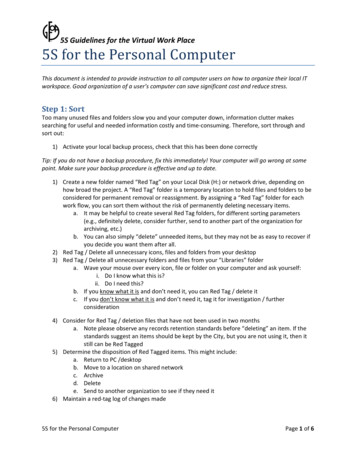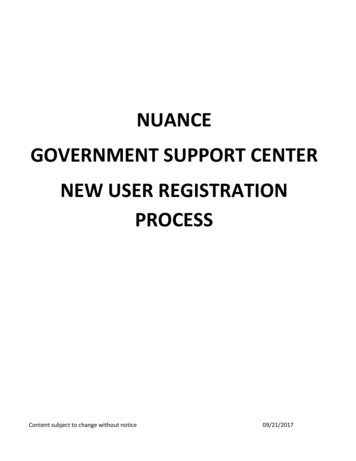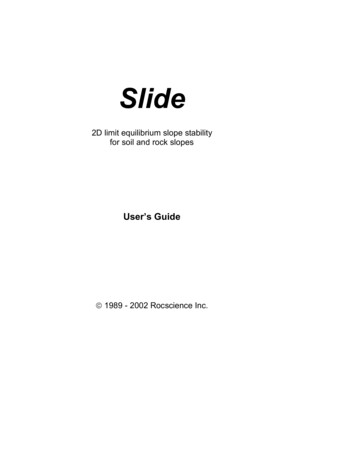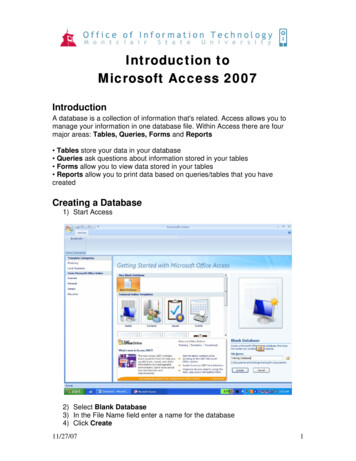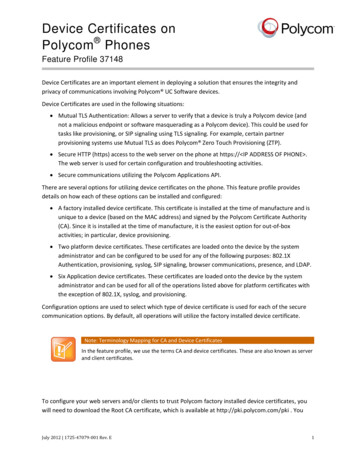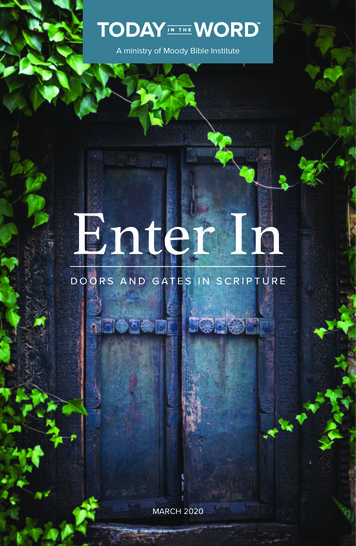
Transcription
A ministry of Moody Bible InstituteEnter InD O O R S A N D G AT E S I N S C R I P T U R EMARCH 2020
Today with Mark JobeIs Christianity Too Narrow?From the President of Moody Bible Institute“Christianity is narrow enough to lead to life,but it is broad enough to lead to grace.”When I was datingmy wife, Dee, I tookher to the smalltown in Spain whereI grew up. I wasexcited to show herthe caves I exploredas a boy, crawlingthrough dark tunnels by flashlight todiscover enormous caverns filled withstalactites and stalagmites. Because wewere young and in love, Dee agreed tothis adventure. As I led her through themud in the ever-narrowing passage, Icould hear her begin to panic. What ifwe got stuck? But, twenty feet later, westepped into this spectacular cave. I saidto her, “It’s narrow to get there. But, boyis it worth it!”I thought about that story becauseChristianity is like that. Some people say,“It’s way too narrow.” And they are right.But you have to go through somethingvery narrow to get to somethingextremely great. Living in today’spluralistic culture, I’m sure you’ve heardpeople say, “I don’t believe in absolutetruth. Each of us has to discover our owntruth for ourselves.” Or: “All religionshave a piece of truth, but none of themcan claim all the truth.” We are pressured(800) 356-6639to see all religious beliefs as equallyvalid. We are told that no single view canbe completely right, and that if we holdthis attitude, we are unreasonable.But, according to Scripture,Christianity is radically narrow. Listen toJesus’ words: “Enter through the narrowgate. For wide is the gate and broad isthe road that leads to destruction, andmany that enter through it. But smallis the gate and narrow is the road thatleads to life, and only a few peoplefind it” (Matt. 7:13–14). Jesus is clear.There is only one God and one way toGod. There is no other way but throughJesus. In John 14:6, Jesus says, “I am theway and the truth and the life. No onecomes to the Father except through me.”Here, Jesus instructs us that there are nomultiple ways to be right with God. Thereis no Plan B. There is no other option.To embrace any other way to Godis to deny the salvation of Jesus Christ. Ifthere were multiple ways, Jesus wouldnever have come. He would not haveneeded to die on the Cross. Friend,Christianity is narrow enough to leadto life, but it is broad enough to lead tograce. God’s truth is indeed narrow, butHis boundless, incomprehensible loveassures us that grace is wide.
Practical TheologyExclusively Inclusiveby Dr. John Koessler“By making Jesus the only door through which we can find salvation,God opened the way to include everyone who comes in faith.”In this pluralistic and inclusive age, it ispopular to think that many diverse roadscan lead to God. With so many beliefsystems, how can just one be correct?Those who assert this opinion considerthe church’s claim that Jesus alone is thegate of salvation an example of culturalarrogance. How can we as Christ’sfollowers respond to this criticism?First, it is important for us to realize thatthis claim did not originate with thechurch. This claim of exclusivity tracesto Jesus Himself, who declared, “I amthe way and the truth and the life. Noone comes to the Father except throughme” (John 14:6).Second, the gift of salvationthrough faith in Jesus Christ is offerednot just to a select few, but to all. Jesusis the gate and the door, but He alsoextends this gift of salvation broadly as“the Lamb of God, who takes away thesin of the world!” (John 1:29). 1 John2:2 says, “He is the atoning sacrifice forour sins, and not only for ours but alsofor the sins of the whole world.” Jesusassured us that whoever comes to Himwill not be turned away (John 6:37).By making Jesus the only doorthrough which we can find salvation,God opened the way to includeeveryone who comes in faith. Jesusis to salvation what Adam was to sin.Paul explains this relationship in thesewords: “Consequently, just as onetrespass resulted in condemnation forall people, so also one righteous actresulted in justification and life for allpeople” (Rom. 5:18). Christ came as ourrepresentative and as our substitute.You might say that the salvationthat Jesus offers is exclusively inclusive.The promise of forgiveness can beconsidered exclusive because it comesonly through Christ. But, it is alsoinclusive because the invitation toreceive this gift is offered to all: “For justas through the disobedience of the oneman the many were made sinners, soalso through the obedience of the oneman the many will be made righteous”(Rom. 5:19). By making righteousnesscontingent on the One, God openedthe way of salvation to many. For Further StudyTo learn more, read Only One Way: Christian Witness in an Age of Inclusionedited by Michael L. Johnson and Richard D. Phillips (P&R Publishing).MOODY BIBLE INSTITUTE
Go DeeperWe hope these questions will help you consider (or discuss with others) what Godis teaching you through this month’s study of His Word. We’ve left a bit of room towrite down your thoughts as well!WEEK 1: What do you do when sin is crouching at your door (see March 17)?How might you help other believers in the same situation?WEEK 2: What Bible verse(s) do you have posted or hanging in your home? Howare you living up to them? In what ways might you do better?WEEK 3: How might you explain to someone, with gentleness and respect (1 Peter3:15), that Jesus is the only way to God?WEEK 4: Doors in Scripture are sometimes connected with hospitality. What isbiblical hospitality? How can you grow in this practice?(800) 356-6639
March 2020Enter InLift up your heads, you gates; be lifted up, you ancient doors,that the King of glory may come in.—Psalm 24:7“Here I am! I stand at the door and knock. If anyone hears my voice and opens thedoor, I will come in and eat with that person, and they with me” (Rev. 3:20). Whata powerful picture! Christ stands at the heart’s door of every believer. Our Saviordesires a closer, deeper relationship with His people; He wants to dwell with us.This image of the door of our heart is one of many mentions of doors andgates in Scripture—our study in this month’s Today in the Word. We pray that aswe explore this topic—from Jacob’s dream and the gate to Heaven in Genesis allthe way to the image of the New Jerusalem’s gates in Revelation—you’ll grow inyour relationship with Christ and better understand: The significance of doors and gates in Scripture How to connect these images with the truth of salvation in Christ Our need to hear Christ’s voice and follow Him as the only “gate for the sheep”(John 10:7) God’s invitation to deeper fellowship with Him (Rev. 3:20)Thank you for your support of the ministry of Today in the Word! Yourpartnership is vital as we bring the Word of God to thousands of people aroundthe world, helping them open their hearts and lives to “the way and the truthand the life” (John 14:6). VOLUME 33 ISSUE 3Managing Editor: Jamie Janosz Senior Editor: Elena Mafter Contributing Editor: John Koessler Writer: Brad BaurainArt Director: Lynn Gabalec Graphic Designer: Rachel Hutcheson Marketing & Production: Paul B. CurrieMoody Bible Institute is the sole publisher of Today in the Word, copyright 2020 by Moody Bible Institute. All rightsreserved. Please direct all Today in the Word inquiries to Donor Resource Management, 820 N. LaSalle Blvd., Chicago,IL 60610. Scripture taken from the Holy Bible, New International Version , NIV , copyright 1973, 1978, 1984, 2011by Biblica, Inc. Used by permission. All rights reserved worldwide. Scripture taken from the New American StandardBible , copyright 1960, 1962, 1963, 1968, 1971, 1972, 1973, 1975, 1977, 1995 by the Lockman Foundation. Usedby permission. Printed in the U.S.A. Today in the Word is published monthly. Printed on 30% recycled paper.TODAYINTHEWORD.ORG
Sunday, March 1Gates and DoorsRead Psalm 24Be lifted up, you ancient doors, that the Kingof glory may come in.—Psalm 24:7If you close your eyes, can you picturethe door of your childhood home?Maybe you remember unlatching thegate that led to your backyard? If youreturned to these same places today,you might pause—before you walkedthrough—to remember the past.In the ancient near East, atriumphant king or leader entering awalled city or temple would pause andperform what scholars have labeleda “gate liturgy.” The ritual marked theimportance of the victory and offeredthanks to their god.In today’s reading, David pausesat the gate to honor and thank God!His words honor the arrival of the Arkin Jerusalem (2 Samuel 6). This wasan extraordinary occasion marked bysacrifices, music, dancing, feasting,and worship. In this beautiful Psalm,David declares that the Lord rulesover all creation (vv. 1–2). He alone isworthy to be worshiped!What are the qualifications forworthy worshipers (vv. 3–4)? They mustbe righteous inside and out, with cleanhands (can be seen) and a pure heart(cannot be seen).The leader of the procession callsdramatically for the city gates to openand receive the Ark, symbolizingthe presence of God (vv. 7–10).The expression “Lift up your heads,you gates” implies welcome andsubmission. The authority of the “Kingof glory” is being recognized andcelebrated!This month we will look at thedoors and gates in Scripture. We willexamine the doors and gates in Israel’shistory; then, we will consider Christ’sredemption, ending at the gates ofthe New Jerusalem. By examiningthese important mentions of gates anddoors, we will better understand God’sfaithfulness and mercy. As we enter this new study, let’spause at the gate to honor God,celebrating who He is in our lives,and why He alone is worthy of praise.Open the “door” of your heart for theKing of glory and allow Him to enter!Pray with UsThank you for joining us in our Bible and prayer journey with Today in the Wordthis month. Our prayer today is that the Lord will show us what we need to learnto have a closer walk with Him, hear His voice, and enjoy His presence.6TODAY IN THE WORD
Monday, March 2Protection and SecurityRead Judges 16:1–21He breaks down gates of bronze andcuts through bars of iron.—Psalm 107:16When I was a child, my fatherinstalled a deadbolt on the frontdoor of our home. Since at the timeit was the safest lock we knew, wefelt very well-protected! Times havechanged, though, and nowadays manyhomeowners set up high-tech securitysystems, complete with video camerasand motion sensors.In biblical times, the city gateplayed a significant role in protectingand defending against enemies. Tokeep a hostile army out of a walledcity, they simply shut and barred thegate. God’s loving strength exercisedin “wonderful deeds” on behalf ofHis people is pictured using this sameimage of a city gate in Psalm 107: “Hebreaks down gates of bronze and cutsthrough bars of iron” (vv. 15–16).That’s what makes Samson’s feat intoday’s reading so amazing. Samsonsinglehandedly tore loose the doorsand posts of the city gate of Gaza andwalked off with them (v. 3)! Not onlydid they likely weigh a total of 400-500pounds, they were also firmly anchoredand reinforced. While the Philistineshad planned to trap and ambushSamson in Gaza, they never stood achance. All by himself, he wrecked thecity’s main defense.The Lord had blessed Samson withincredible physical strength, but heweakened himself by toying with sinand temptation. Maybe that is why hethought he could get away with sin.He taunted Delilah and failed to takewarning from her betrayals. Eventually,his moral strength failed and hedisobeyed God by telling his secret (v.16), disrespecting his Nazirite vow andGod’s special gift of strength (v. 20).Samson’s physical strength contrastedstarkly and tragically with his moraland spiritual weakness. Do you consider yourself strong:physically or spiritually? Samson’sstory reminds us that we should neverconfuse God’s strength with our own.Don’t mess with sin! Samson acted asif he were in control and invincible,instead of trusting and relying on theLord (Prov. 3:5–6).Pray with UsToday’s devotional prompts us to rely on God’s strength, rather than on our own.Let’s praise our all-powerful God that His strength overcomes all obstacles and,as today’s key verse says, “cuts through bars of iron.”MOODY BIBLE INSTITUTE7
Tuesday, March 3Gates and the SabbathRead Jeremiah 17:19–27Keep the Sabbath day holy,as I commanded your ancestors.—Jeremiah 17:22If you’re familiar with the story of Ruth,you might remember how Boaz “askedpermission” to marry her (Ruth 4:1–12).Boaz was legally required to negotiatewith a relative who had a prior claimon the widow and her land. When thatman gave up his right, Boaz was free tomarry Ruth. Where this agreement tookplace, the city gate, lends importantinsight to today’s reading.Jeremiah once again mentionsthe city gate. In biblical times, notonly were these gates necessary forprotection, but they were a place toconduct business. Boaz knew theelders of the town would be present toserve as witnesses.The prophet Jeremiah delivered amessage from the Lord at the Gate ofthe People and other gates (vv. 19–20).Why? He knew that many peoplewould be present at this location tohear him. He also knew it would bea good visual aid. By bringing loadsof goods through the city gates on theSabbath, the people were breakingGod’s commands to keep the Sabbathday holy (vv. 21–23). This washappening in view of all!Honoring the Sabbath is the fourthof the Ten Commandments, where it islinked back to creation (Ex. 20:8–11).Keeping it was a matter of holiness.This was important! Jeremiah also putthe choice and its consequences interms of the city gates: If they obeyedthe Lord and stopped bringing loadsthrough the gates, then kings in theDavidic line would continue to comein through those same gates and thenation would prosper (vv. 24–26). Ifthey continued to disobey, God wouldbring judgment on Jerusalem in theform of foreign conquerors who wouldburn her gates (v. 27). Like all God’s commands, theSabbath is a gift intended for our good.Rest and renewal are built into God’sdesign for His creation (Gen. 2:2–3).How can you honor God’s gift of theSabbath and put into practice Hisdesire for you to rest?Pray with UsLord, thank you for the gift of rest! We pray for wisdom to know what true restis, to appreciate your Sabbath, and to enter into your rest through the gates ofthanksgiving and praise.8TODAY IN THE WORD
Wednesday, March 4A Gate Called BeautifulRead Acts 3By faith in the name of Jesus, this man whom yousee and know was made strong.—Acts 3:16Robotic suits can help disabledindividuals walk again! Experimentalbionic limbs or “wearable robots” arecurrently used only in rehabilitationand physical therapy settings, but asmaterials get lighter, computers getsmarter, and batteries last longer,designers hope this technology willallow use in everyday life.Peter didn’t need robotics to helpa lame man walk. He healed the manwith a word by the power of Christ (vv.6–7). By sitting at the temple’s BeautifulGate (v. 2), also called the NicanorGate, the crippled beggar could be sureof attention from crowds of people whomight be in a mood to give him money.Peter, however, gave him somethingbetter. The healed man responded by“walking and jumping, and praisingGod,” thereby demonstrating joyfulfaith (v. 8).Because of the Beautiful Gatesetting and the fact that many localsknew the healed man (vv. 9–10),Peter’s miracle attracted immediateattention. Faithful Jews would havebeen reminded of the prophecy ofIsaiah 35:6: “Then will the lame leaplike a deer.” A large crowd gathered,and Peter was able to preach anevangelistic sermon, just as he had atPentecost (see Acts 2).Peter’s message was not an eartickling one about how Jesus meets ourneeds. He accused the people of killingthe Son of God, who had nonethelessrisen from the dead (vv. 13–15). Hegave God the glory for the miraculoushealing they’d all just witnessed (v. 16),summarized God’s plan of redemption(vv. 18, 24–26), and issued a call torepent and turn to Messiah Jesus (vv.19–23). Many responded with faithin Christ, although the attitudes of theJewish leaders continued to be hostile(see Acts 4:1–3). What social gathering places todayare the equivalent of the biblical citygates? Shopping malls? Social media?How can we bring God’s words andpower into these places for His gloryand the expansion of His kingdom?Pray with UsToday is the Moody Bible Institute Day of Prayer. With today’s focus on worshipand prayer, please continue to uphold Moody’s mission and vision, as well as ourdonors and staff. Thank you for your faithful support of Moody’s ministries!MOODY BIBLE INSTITUTE9
Thursday, March 5The Gate of HeavenRead Genesis 28:10–22This is none other than the house of God;this is the gate of heaven.—Genesis 28:17Have you ever passed an antiquewardrobe and wondered if there mightbe a wintry world on the other side? InC. S. Lewis’s The Lion, the Witch, andthe Wardrobe, a wardrobe provides agateway to Narnia. Lewis seemed fondof these passageways to another timeand place. In Prince Caspian, Aslancreates a “door in the air” and in TheLast Battle, the characters pass througha stable door into a new world as theold Narnia ends.Imagine Jacob’s surprise when hewas presented with a similar amazingdoor! One could hardly imagine aless likely time for Jacob to be given avision of heaven. He was running awayfrom a messed-up family situation,including an angry brother and anoffended father. That night, he saw in adream a “stairway resting on the earth,with its top reaching to heaven, andthe angels of God were ascending anddescending on it” (v. 12). What was it?Probably a stairway on the side of aziggurat, a pyramid-like building thatwould have been culturally familiaras a kind of temple. The angels weregoing up and down, going about theirLord’s business.In the dream, God renewed Hiscovenant with Jacob (vv. 13–15).Why now? Jacob was at a low pointand needed encouragement. Hewas leaving the Promised Land andreceived assurance that he wouldreturn. God chose this moment toremind Jacob that the covenant was notabout his own merit or worthiness, butabout God’s faithful love and glory.Jacob responded: “How awesomeis this place! This is none other thanthe house of God; this is the gate ofheaven” (v. 17). He set up a memorialstone and named the place Bethel, orthe “house of God” (vv. 18–19). Perhaps, like Jacob, you’restruggling today, maybe from adysfunctional family situation. Howcan God work in our lives whenpeople make such a wreck of things?Fear not! Jesus Himself is the “stairwayto heaven,” bringing the life and truthof heaven to earth (John 1:51).Pray with UsJacob’s example in today’s devotional teaches us about God’s faithful love and Hisglory that overcome all obstacles. Our prayer is that we will remember that God’sfaithfulness depends on His nature and promises, and not on our own merit.10 TODAY IN THE WORD
Friday, March 6Gates of DeathRead Psalm 9:1–14Have mercy and lift me up fromthe gates of death.—Psalm 9:13The Bible’s gates of hell or “gates ofdeath” (v. 13) may remind Lord ofthe Rings fans of the Black Gate ofMordor. In J.R.R. Tolkien’s books andthe movie adaptations, the Black Gateis a fearsome structure—dark, huge,seemingly invulnerable, and guardedby legions of powerful, evil creatures.Merely to approach this gate was to betempted to despair.Psalm 9 contrasts the “gates ofdeath” (v. 13) with the “gates of Zion”(v. 14). First, it announces itself as asong of praise and thanksgiving (vv.1–2). Then the telling “of all yourwonderful deeds” opens by describingwhat God had done to Israel’s enemies(vv. 3–6). He’d rebuked and sent ruinupon them, while upholding andvindicating His people. The praisecontinues by describing God’s overallworthiness to be worshiped (vv. 7–12).The Lord is on His throne, rulingsovereignly over all nations. He is justand righteous. For the oppressed, He isa refuge and stronghold. He is eternallyconstant: “You, LORD, have neverforsaken those who seek you” (v. 10).We “who know your name” should beproclaiming to the world His love andfaithfulness (v. 10).The two gates appear in the nexttwo verses, where David prayed forGod to act with mercy and power, asHe had in the past (vv. 13–14). Thesituation was dire. He felt as though hewas at the very “gates of death.” Butif God would have mercy and rescuehim, he would remain able to singGod’s praises “in the gates of DaughterZion,” that is, Jerusalem, “and thererejoice in your salvation.” Thisrepresents a complete reversal. To betransported from the “gates of death”to the “gates of Zion” is an impossiblemiracle, something only God could do! Are you feeling closer to the “gatesof death” or to the “gates of Zion”today? No matter how you may feel,remember God is present with youand delights to hear your prayers. Asthis psalm shows, praise, thanksgiving,and cries for help can all be expressedtogether!Pray with UsAs today’s reading from Psalm 9 shows, we can express a gamut of emotions whenwe come to God, even a desperate cry for help. What do you need to express to theLord in prayer today: praise, thanksgiving, fear, despair? He hears you!MOODY BIBLE INSTITUTE 11
Saturday, March 7The Doors of Solomon’s TempleRead 1 Kings 6:11–38Splendor and majesty are before him; strengthand joy are in his dwelling place.—1 Chronicles 16:27Renaissance sculptor Lorenzo Ghibertidesigned special bronze doors for acathedral in Florence, Italy. Called the“Gates of Paradise,” they stand 17 feethigh and weigh 4.5 tons. Artistically,they feature ten richly detailedpanels depicting stories from the OldTestament, including Moses receivingthe Law and the Israelites’ conquestof Jericho. It took Ghiberti and hisworkers 27 years to create theseamazing doors!No doubt the doors of Solomon’stemple were equally impressive.After all, Solomon was king duringthe golden age of Israel. God hadpromised his father David that his sonwould build a magnificent templefor the Lord. David had gathered thevery best construction and artisticmaterials, including cedar and gold,for him to work with. The designs ofthe tabernacle and the temple wereessentially the same, with the MostHoly Place at the center. Like thetabernacle, the temple was the nationalworship center and symbolized God’spresence. The building project, whichtook seven years in all (v. 38), was theperfect occasion for God to renew Hiscovenant (vv. 11–13).The doors of the temple aredescribed in verses 31–35. The door tothe inner sanctuary was made of olivewood and decorated with cherubim,flowers, and palm trees, overlaid withgold leaf. These may have been foldingdoors, similar to the ones Ezekielsaw in his vision (Ezek. 41:23–25).The door to the main hall was madeof juniper and decorated with goldcovered carvings, intended to suggestparadise or the Garden of Eden. Why?As the NIV Study Bible explains: “Ina symbolic sense, readmission to theparadise of God is now to be had onlyby means of atonement for sin at thesanctuary.” Since a picture is worth a thousandwords, why not look up a drawingof Solomon’s temple? Using biblicaldescriptions, illustrators have been ableto accurately depict its grandeur.Pray with UsMoody undergraduate students will travel across the country and world as theirspring break begins today. Some are serving in ministry, while others rest at home,spending time with family. Our students will be grateful for your prayers.12 TODAY IN THE WORD
Sunday, March 8Gatekeepers of the TempleRead 1 Chronicles 9:17–29Serve wholeheartedly, as if you were servingthe Lord, not people.—Ephesians 6:7Do modern churches have gatekeepers?Yes, but unfortunately the reason haschanged. As reported in ChristianityToday, “Armed security at churchesis becoming a new norm.” Why? “Anestimated 617 worshipers have beenkilled in violent incidents in the U.S.since 1999, and the number of attacksat houses of worship has risen almostevery year.”The 212 gatekeepers of Solomon’stemple filled important “positions oftrust” (v. 22). They were drawn fromamong the Levites, with rotatingshifts that manned guard stations onall four sides of the temple (1 Chron.26:12–18). Phinehas, son of Eleazar,had been in charge of the tabernaclegatekeepers, so this group had aheritage of zeal for God’s name (v. 20).In Numbers 25, Phinehas took actionagainst a brazen example of sexualimmorality and idolatry and therebyturned God’s anger away from Israel.What were the gatekeepers’responsibilities? These varied atdifferent times in history, but theirmain duty was to guard the gates of thetabernacle or temple (v. 23). This wasn’tbecause God needed protection, butto prevent people from intentionallyor unintentionally doing disrespectfulor blasphemous things in God’s house.They had charge of the keys (v. 27),kept watch over the treasuries (v. 26),and served as stewards of the variousarticles and supplies needed forworship (vv. 28–29).Gatekeeper functions recordedelsewhere in Scripture includepreventing ceremonially uncleanpeople from entering (2 Chron. 23:19)and collecting and distributing freewillofferings (2 Chron. 31:4; 34:9). Theyassisted in Josiah’s revival specificallyby removing pagan idols from thetemple (2 Kings 23:4). They wereindividuals who served behind thescenes with excellence! Ushers or greeters serve as onekind of “gatekeeper” in our churchestoday. Today, thank one or more ushersfor their service to your congregation.Pray with UsWill you encourage in prayer Moody’s graduate students whose spring break alsobegins this week? It’s a privilege to provide a Moody education for today’s Christianleaders, and we appreciate your prayer support for Moody Theological Seminary.MOODY BIBLE INSTITUTE 13
Monday, March 9One Day in Your CourtsRead Psalm 84Better is one day in your courtsthan a thousand elsewhere.—Psalm 84:10“Better is one day in your courts thana thousand elsewhere.” You mayrecognize this chorus from the popularworship song written by Matt Redman,but these lyrics actually originated inthe Psalms. The sentiment is just as truetoday. Both then and now, our heartscan only be fully satisfied when we arein God’s presence.The psalmist expresses a longingfor God’s presence, which is comparedhere to the temple in Jerusalem (vv.1–4). This longing is all-encompassing:“My heart and my flesh cry out forthe living God” (v. 2). This longingmotivates our journey: “Blessed arethose whose strength is in you, whosehearts are set on pilgrimage” (v. 5).The “psalmist” here is actuallyplural—the “Sons of Korah,” aLevitical choir. The Sons of Korahwere gatekeepers in the temple (seeyesterday’s study). So they weren’tlonging to become doorkeepers in thehouse of the Lord (v. 10). They alreadywere! The original occasion for thispsalm, however, might have beenwhen King Sennacherib of Assyriaattacked and Hezekiah bought himoff with all the silver and gold in thetemple (2 Kings 18:13–16). In that case,the temple would have been unable tobe used for worship. The backgroundfor the prayer of verses 8–9 might thenshow their desire for this problem to beresolved.In any case, those of us wholong for God and have our hearts seton pilgrimage are blessed (vv. 5–12).Faith does not depend on our externalcircumstances. Even if one is passingthrough the Valley of Baka, presumablya hard or dry place, faith can make ita place of refreshing springs (v. 6). Theblessing of faith is God Himself—beingin God’s presence is good because GodHimself is good (v. 11). Do you long to experience God’spresence? Why not read or recitePsalm 84 aloud? Doing so would bean excellent way to begin and endyour day. Let the beautiful truths in thispsalm encourage your journey.Pray with UsLet’s join the psalmist’s prayer in today’s reading, asking for God’s presence, love,and mercy to be with us all the days of our lives. May the Lord show us afresh howto recognize and enjoy His presence.14 TODAY IN THE WORD
Tuesday, March 10Gates of ThanksgivingRead Psalm 100Shout for joy to the LORD, all the earth.Worship the LORD with gladness.—Psalm 100:1At one time in church history, ordinaryChristians didn’t sing. Instead, theylistened while sacred music wasperformed by professionals. But thanksto the Reformation and the inventionof the printing press, congregationalsinging made a comeback. The firsthymnal was printed in 1532. Simple,singable tunes and sturdy theologicallyrics helped believers worship andlearn about their faith at the same time.Singing has long been a partof how we worship God. The firstsong recorded in Scripture is the onesung by Moses and Miriam after themiraculous crossing of the Red Sea (Ex.15:1–21). Many refer to the Psalms as“the Bible’s hymnbook,” and Psalm 100is an excellent example why.This psalm opens with a callfor “all the earth” to praise the Lordand to “come before him with joyfulsongs” (vv. 1–2). “Shout for joy” iselsewhere translated “Make a joyfulnoise,” a phrase beloved by those ofus who cannot sing. Why should wepraise the Lord? Because God is God(v. 3). Furthermore, He has a specialrelationship with His people. He madeus His own, and we belong to Him.“We are his people, the sheep of hispasture” (v. 3).Therefore, we should “Enterhis gates with thanksgiving and hiscourts with praise” (v. 4). The previousverse pictured us as sheep and impliedthat God is our shepherd (see also Ps.23; John 10:11–15), so it may be thatthe psalmist has a sheep-gate in mindhere. But the main reference is likelythe temple gates. It’s easy to picturethis psalm being sung by a joy-filledprocession of worshipers entering thetemple! The blessing of worship is GodHimself—being in God’s presence isgood because God Himself is good,loving, and faithful (v. 5). If you love to study hymns or usethem in your devotional time, youmight enjoy the recently publishedanthology of classic hymns (plus notes),40 Favorite Hymns on the ChristianLife: A Closer Look at Their Spiritualand Poetic Meaning, by Leland Ryken.Pray with UsSinging can be a way of praying! Psalm
only through Christ. But, it is also inclusive because the invitation to receive this gift is offered to all: "For just as through the disobedience of the one man the many were made sinners, so also through the obedience of the one man the many will be made righteous" (Rom. 5:19). By making righteousness contingent on the One, God opened


